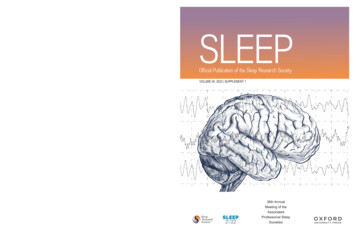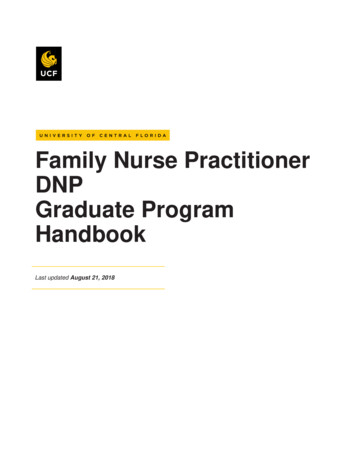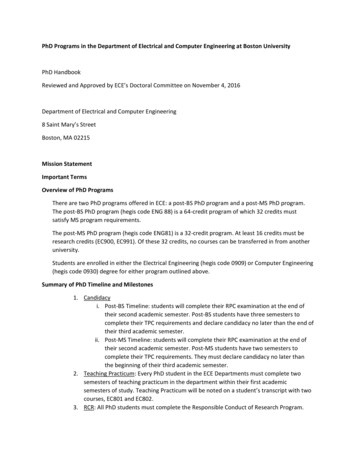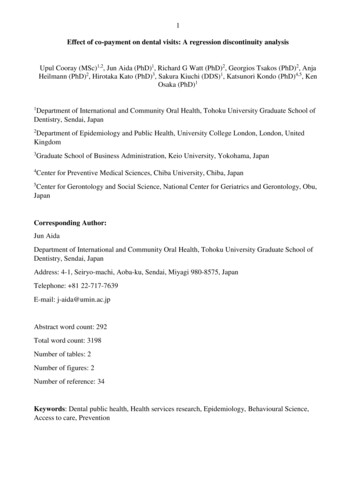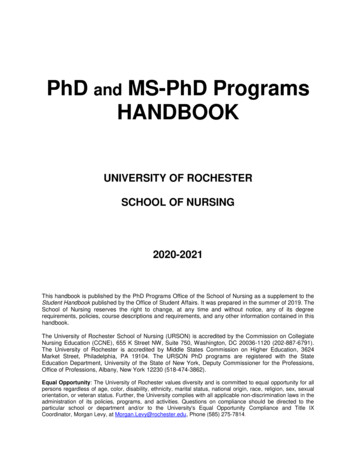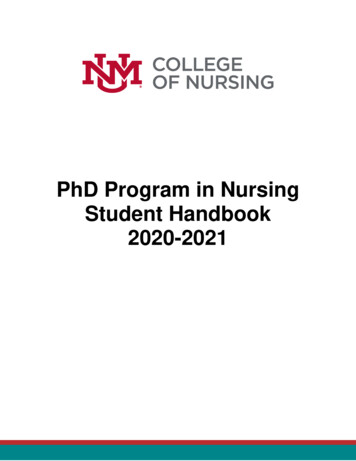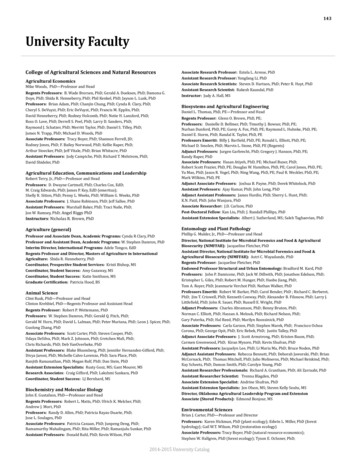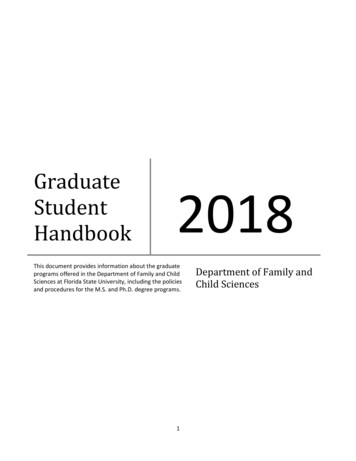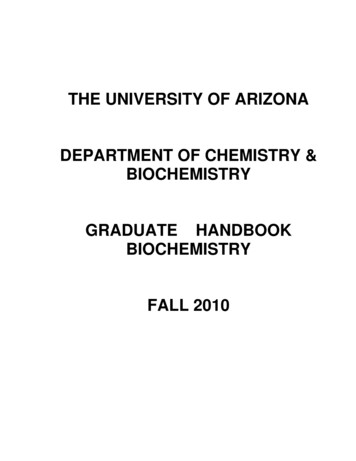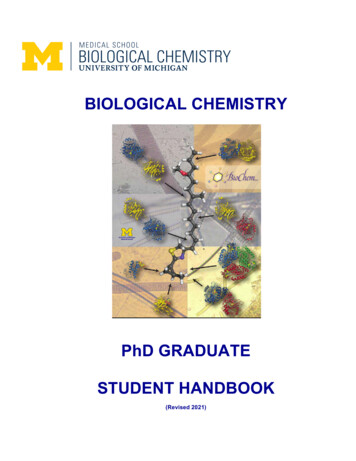
Transcription
BIOLOGICAL CHEMISTRYPhD GRADUATESTUDENT HANDBOOK(Revised 2021)
About the CoverJennifer Gehret McCarthy, Ph.D. (Biological Chemistry 2012)The marine environment, full of bioactive natural products, is largely untapped. Naturalproducts, including those found in the marine environment, exhibit an impressive arrayof chemical diversity and often potent bioactivity, which can be harnessed fortherapeutics. Many unusual enzymes reside in natural product assembly-line pathways,and create the diverse collection of chemical functional groups found in naturalproducts. The study of enzymes in natural product biosynthetic pathways can revealnew modes of catalysis, unique chemical transformations, and novel biosynthetic tools.The antimitotic natural product curacin A is a perfect example of interesting chemistryfound in the marine environment.Curacin A (center), produced by the marine cyanobacterium Moorea producens(background), contains many interesting chemical groups including cyclopropane andthiazoline rings, an internal cis double bond and a terminal alkene. Equally interestingare the structural details of the biosynthetic pathway that produces curacin A (arrows),giving insight into how each unique chemical group is made. Shown are the publishedstructures from the curacin A biosynthetic pathway (starting from the top left and movingcounter clockwise): a dehydratase that produces a trans double bond1, a dehydratasethat produces a cis double bond1, an acyl carrier protein involved in cyclopropanebiosynthesis2, a loading enzyme with dual decarboxylase and acetyltransferaseactivities3, an Fe2 /a-ketoglutarate dependent halogenase involved in cyclopropanebiosynthesis4, a decarboxylase that establishes regiochemistry for cyclopropaneformation5, a dehydratase that produces a trans double bond1, and a b-sulfate specificthioesterase that produces a terminal alkene6.1.2.3.4.5.6.D.L. Akey, et al., Structure 18,94(2010).A. Busche, et al., ACS Chem boil 7, 378(2012).L. Gu, et al, Science 318, 970(2007).D. Khare, et al., Proc Natl Acad Sci USA 107, 14099 (2010)T.W. Geders, et al., J Biol Chem 282, 35954 (2007)J.J. Gehret, et al., J Biol Chem 286, 14445 (2011).2
CONTENTSI. Program Overview4II. Program Administration4III. Admission and Application4IV. Academic Program5PhD Program Requirements5Laboratory Rotations7Selection of thesis/dissertation advisor7Preliminary Exam8Advancement to Candidacy8Formation of Thesis Advisory Committee8Master’s Degree9Dissertation Defense and Final Oral Examination9Biological Chemistry Seminar Series9Work Hours, Vacation Guidelines and Other Employment10V. Academic Standing10VI. Academic Probation and Dismissal11VII. Policy and Procedure for Placing a Student on Probation12VIII. Departmental Events13IX. Web Resources14Addendum: Mentoring Plans163
I. PROGRAM OVERVIEWThe Department of Biological Chemistry at the University of Michigan offers a Ph.D.degree through the Rackham School of Graduate Studies. The Ph.D. program includesformal course work, seminars, individual study and original research. Current areas ofresearch include structural biology, protein biochemistry, enzyme reaction mechanisms,molecular genetics, signal transduction, neurobiology, and cell and developmentalbiology. The common theme is an interest in understanding biological phenomena atthe molecular and mechanistic level.II. PROGRAM ADMINISTRATIONGraduate Program DirectorGraduate Program ManagerDr. Anne VojtekMs. Beth Goodwinavojtek@umich.eduegoodwin@umich.eduAcademic Advisors:Dr. Anne VojtekDr. Mike UhlerDr. Pat O’BrienDr. Peter FreddolinoDr. Bruce ich.edupetefred@umich.edubrupalf@umich.eduIII. ADMISSION AND APPLICATION TO THE PROGRAMThe Program in Biomedical Sciences (PIBS) is the gateway for biomedical sciencegraduate study at the University of Michigan. PIBS was created to provide flexibility tostudents in their choice of dissertation mentor and graduate program. PIBS coordinatesthe first-year graduate studies for 13 Ph.D. programs at the University of Michigan.These programs are: Biological Chemistry, Bioinformatics, Cancer Biology, Cell andDevelopmental Biology, Cellular and Molecular Biology, Genetics and Genomics,Immunology, Microbiology and Immunology, Molecular, Cellular, and DevelopmentalBiology, Molecular and Cellular Pathology, Molecular and Integrative Physiology,Neuroscience, and Pharmacology. When applying to PIBS, students will be asked tospecify the two departmental programs they are most interested in, although there areno restrictions to those programs when choosing rotation laboratories (see page 7 foradditional information). Students seeking a Ph.D. in Biological Chemistry should applydirectly to PIBS at the University of Michigan for admission, and designate BiologicalChemistry as their primary department of interest on the application form.Online applications are accepted from September through December 1 and areavailable from PIBS. See rograms/phd-admissions for instructions and applications.4
IV. ACADEMIC PROGRAMPh.D. Program RequirementsGraduate work in the Department of Biological Chemistry combines the rigor ofadvanced study with the flexibility for students to design their own optimum curriculum.Coursework consists of both required and elective components. Elective courseworkmust be didactic, graded, relevant graduate-level course work. A minimum of 4biological chemistry advanced elective credits (2 courses) is required. To best matcheach student’s individual interests and needs, students choose elective coursework inconsultation with their research mentor. Elective coursework outside the BiologicalChemistry Department requires approval by Biological Chemistry academic advisors.Biological Chemistry PhD Graduate CurriculumA. Biological Chemistry Required Course:BIOLCHEM 660 Molecules of Life: Protein Structure, Function & Dynamics (2 Cr, F)B. Biological Chemistry Advanced Electives (4 Credits/2 courses minimum):FallBIOLCHEM 650 Eukaryotic Gene Transcription (2 Cr, F)BIOLCHEM 690 Biochemical Regulatory Mechanisms (2 Cr, F)WinterBIOLCHEM 528 Biology and Chemistry of Enzymes (2 Cr, W)BIOLCHEM 597 Critical Analysis (2 Cr, W)BIOLCHEM 640 Regulatory RNA and Control of Gene Expression (2 Cr, W)BIOLCHEM 602 Protein Crystallography (3 Cr, W 2023)BIOLCHEM 673 Enzyme Kinetics (3 Cr, W)BIOLCHEM 675 Biochemistry of Membranes and Organelles (2 Cr, W)C. Additional Biological Chemistry ElectivesFallBIOLCHEM 713 Emerging Areas of Biochemistry (1 Cr, F)D. Additional required courses:BIOLCHEM 712 Biological Chemistry Seminar Series (2 Cr, F/W)Register F/W every yearBIOLCHEM 711 Graduate Seminar (2 Cr, F/W)Register F/W Year 2 & 3PHRMACOL 502 Introduction to Scientific Communication (2 Cr, F)Register Fall Semester Year 2PIBS 503 Research Responsibility & Ethics (1 Cr, F)Register in Year 1 & Year 5PIBS 504 Rigor and Reproducibility (1 Cr, W)E. Electives*** (3 Cr minimum):FallBIOINF 527 Introduction to Bioinformatics and Computational Biology (4 Cr, F)5
BIOINF 528 Advanced Applications of Bioinformatics (3 Cr, F)BIOPHYS 520 Techniques in Biophysical Chemistry (3 Cr, F)CDB 530 Cell Biology (3 Cr, F)CDB 560 Quantitative Cell Biology (4 Cr, F)HUMGEN 541 Molecular Genetics (3 Cr, F)WinterBIOINF 524 Foundations for Bioinformatics (3 Cr, W)PHYSIOL 555 Method and Logic in Biomedical Science (3 Cr, W)HG 551 Computational Genomics (3 Cr, W)PATH 581 Tissue, Cellular and Molecular Basis of Disease (4 Cr, W)PHYSIOL 510 System and Integrative PhysiologyCDB 582 Stem cells: Organogenesis to Regenerative Biology (3 Cr, W)***This is a partial list. Consult your research mentor and academic advisor if you wouldlike to take an elective course not listed above.F. Research:PIBS 600 Biomedical Science Independent Study (F/W, Year 1)BIOLCHEM 990 Dissertation –Precandidate ResearchBIOLCHEM 995 Dissertation –Candidate ResearchIn addition to coursework and conducting research, the Biological Chemistry PhD hasthe following additional requirements: Students are required to attend the Biological Chemistry Departmental Seminars,and attendance at 75% of the Biological Chemistry Departmental seminars persemester is mandatory. Students gain valuable teaching experiencing by serving as a teaching assistantin Biological Chemistry for one semester. Successful completion of the Preliminary/Qualifying Examination is necessary toadvance to Ph.D. candidacy. This examination involves writing a researchproposal and defending it orally before a faculty committee. Progress to degree is monitored by the student’s thesis advisory committee.Meetings are required annually or more often if required by the thesis committee.At the first thesis advisory committee meeting, students prepare an NIH NRSAstyle thesis proposal for discussion with their committee. Students present a research seminar to the department in year 4.Program requirements are reviewed periodically to assess the quality of graduateeducation in the Department and may be subject to change upon review. At thediscretion of the Department, changes may be applied retroactively to students alreadyenrolled in the Biological Chemistry Graduate Program.6
Course Requirements for Students Entering with a Master’s DegreeThe Biological Chemistry program will work closely with the student to devise an optimaleducational program that builds on and complements the student’s prior training.Course Requirements for the Medical Scientist Training Program (MSTP)MSTP students who join the Biological Chemistry PhD program will devise an individualcoursework plan in consultation with the MSTP program and the Biological Chemistry PhDprogram.Biological Chemistry 711 Enrollment Requirements for Students Appointed toTraining GrantsBiological Chemistry PhD students are required to take two years (4 terms) of Biolchem711. If a training grant offers a similar course, the student may request a waiver for oneyear of the two-year requirement for 711. Additional terms of seminars may be requiredby the training grant.TRAININGGRANTCellular Biotechnology Training Program (CBTP)Chemistry/Biology Interface (CBI)Genetics Training Program(Enroll one year of Biochem 711 and two years Gen 631)Pharmacological Sciences Training Program(Enroll in one year of Biochem 711 and Med Chem 740)Vision Training GrantREQUIRED 711ENROLLMENT2 Years(#(4 terms)2 Yearsof(4 terms)1 Year ter(2 terms)ms)1 Year (2 terms)2 Years (4 terms)Laboratory RotationsPIBS students engage in research rotations, choosing rotations during both Fall andWinter terms. PIBS students also have the option to start in the summer, engaging fulltime in a research rotation. Upon completion of the PIBS year, the students elect amentor and degree granting program.Before choosing a laboratory for a rotation, students review faculty research intereststhrough the departmental or PIBS websites and attend formal and informal networkingsessions with faculty, including the Biological Chemistry Annual Retreat. Appointmentswith potential research mentors should be arranged to discuss potential projectsavailable in a given term.Selection of Thesis/Dissertation AdvisorThe design of the PIBS program allows students to perform rotations with any of thefaculty associated with PIBS Ph.D. programs. However, once a mentor is chosen thestudent is expected to join a Ph.D. program with which the mentor is associated. To jointhe Biological Chemistry graduate program, the student’s mentor must be a facultymember in Biological Chemistry or an affiliate member of the Biological Chemistrygraduate program. The only exceptions to this policy would be cases in which there is aclear and extensive collaboration occurring between a primary mentor in another7
program and a co-mentor in Biological Chemistry. In instances like this a very significantamount of the experimental work would be expected to occur in the laboratory of theBiological Chemistry faculty mentor. Approval for a co-mentorship arrangement isgranted by the Graduate Program Director in consultation with the faculty AdvisoryCommittee.PIBS students select thesis advisors and begin full-time laboratory research by thebeginning of the summer following the first year of graduate study. Once your thesisadvisor has been selected, he or she will provide guidance in selecting a dissertationresearch problem, in selecting a Dissertation Committee, and in other aspects of yourgraduate career and professional development. In addition, the graduate programdirector and graduate program advisors along with the Biological Chemistry CareerDevelopment Committee provide mentorship during the graduate school experience.Preliminary/Qualifying ExaminationAt the end of the first year, Biological Chemistry students write and defend orally anoriginal research proposal. The written and oral components of the exam assess thestudent’s understanding of the required course content for the department and thestudent’s ability to reason analytically and to independently develop ideas andexperimental approaches. Students receive specific feedback on the strengths andweaknesses of his/her performance. Both components of the exam must be passed inorder to advance to candidacy. If a student fails either or both of the exam components,the academic probation and dismissal policy applies (Section V-VII).Advancement to CandidacyThe minimal requirements for Candidacy are: (a) Bachelor’s degree or equivalentawarded by an accredited university; (b) a minimum of 18 credits of graded courseworkin residence; (c) graduate didactic coursework in biochemistry and related fields,including Biolchem 660 (see IV. Academic Program, PhD Program Requirements abovefor more detailed information on required coursework and electives); (d) two semestersof PIBS 600; (e) 3 credit hours of cognate coursework with a B- or better; (f) acumulative grade point average of B (3.0 or better on 4.0 scale) AND a minimum gradeof B- in required courses; (g) passing the preliminary examination; and, (h) satisfactoryprogress in research.Formation of Thesis Advisory CommitteeFollowing advancement to candidacy you will be asked to form your dissertationcommittee. Biological Chemistry requires that your committee consist of (at least) fivemembers, including your research mentor. The Chair of your committee must be aBiological Chemistry faculty member or affiliate member of the graduate program, otherthan your dissertation mentor. You may appoint a co-chair if you wish. At least three ofthe members of your dissertation committee will be faculty members of BiologicalChemistry. At least one other member of your committee will be chosen from outside ofthe department (and will not hold any fraction of an appointment in Biological Chemistry)and will be designated as your cognate member. After approval by your mentor, thenames of the members of your committee are submitted to Beth Goodwin in theBiological Chemistry Graduate Program Office. Following approval by the BiologicalChemistry Graduate Program Director, your committee will be officially submitted to the8
Rackham Graduate School. Should the composition of your dissertation committeechange during the course of your thesis research be sure to update the GraduateProgram Office.You are required to form your thesis committee no later than fall semester, year 2(the term after you advance to candidacy) and to hold your first committeemeeting winter term, year 2. Thereafter, you are required to meet with yourcommittee at regular intervals as determined by your dissertation committee butno less than once per year to maintain your academic standing in the program.You are also required to submit reports of your progress to your committee andthe Biological Chemistry Graduate Program Office. Students usually complete theprogram within 5-6 years.Master’s DegreeBiological Chemistry Ph.D. students who have completed a minimum of 24 credit hoursmay apply for a master’s degree. It is possible to meet the Biological Chemistry Ph.D.coursework requirements but not have the required number of credits for receipt of amaster’s degree, as some coursework (including 990, 995 and audited courses) cannotbe counted towards this degree. The degree is not automatically awarded; you mustsubmit a request that the Graduate School award it to you. Contact Beth Goodwin andan academic advisor for the Biological Chemistry Ph.D. program for additionalinformation.Dissertation Defense and Final Oral ExaminationThe Department requires that all five (or more) members of a dissertation committeeread and approve the dissertation and all members should be present at the defense.However, in special cases in which a student has undue difficulty in scheduling all fivemembers for the actual final oral defense, the student can request that the defenseproceed with only four members present. This must include the Chair and the Cognatemember. The Chair of the Defense Committee is the student’s research mentor. To getapproval to hold the defense with only four members present, the student must receiveapproval from all five members. This request can be made by email; all committeemembers must respond to the student and to either the Graduate Program Director orBeth Goodwin.Biological Chemistry Seminar SeriesThe Department of Biological Chemistry sponsors a weekly seminar program during theFall and Winter terms that attracts outside speakers of national reputation. Theseminars are held each Tuesday at Noon and all biochemistry students arerequired to attend. Students are invited and encouraged to meet with the seminarspeakers. In addition to the weekly seminar program, the Department sponsors anannual Distinguished Alumni Lecture and four endowed lectureships: the IrwinGoldstein Lectureship in Glycobiology, the G. Robert Greenberg Lectureship inBiological Chemistry, the William E.M. Lands Lectureship in the Biochemical Basis forthe Physiology of Essential Nutrients, and the Martha L. Ludwig Lectureship inStructural Biology. Attendance at 75% of weekly seminars and biochemistry sponsoredlectureships is required each semester during graduate school. Exceptions are made ona case-by-case basis and include overlapping required coursework and off-site9
internships.Work Hours, Vacation Guidelines and Other EmploymentStudents should consult with their mentors regarding specific laboratory policies onresearch hours and planned absences. Request for time off from research must bedone in advance and in consultation with the student’s mentor. Biological Chemistrystudents and first year PIBS students may take time off on official university holidaysand season days, plus two weeks of the student’s choice (10 business days, M-F), inconsultation with the student’s mentor.Students in Biological Chemistry are expected to commit full-time effort to coursework,research and professional development. Students may not be employed in otherpositions where regularly scheduled work commitments are required. Activities, such astutoring and babysitting, are not considered additional employment, but should also notinterfere with the students’ graduate education and research. Department and traininggrant approved internships for professional development of the graduate student arealso not considered other employment.V. Academic StandingA. The Rackham Graduate School requires a 3.00 cumulative GPA for goodacademic standing, and the Department of Biological Chemistry further requiresall student to receive grades no lower than a B- in coursework. Students inBiological Chemistry who receive a grade lower than a B- in a required coursewho are otherwise in good standing in the program may be asked to repeat theclass or undertake additional coursework. Failure to successfully remediate thecoursework will result in the student being placed on probation. Students areencouraged to be proactive and seek assistance when in difficulty as thedepartment has resources available to assist the students when academicdifficulties occur.B. Once students have achieved candidacy, program requirements for goodacademic standing are: (a) satisfactory progress in research (including grades ofSatisfactory (S) in Biolchem 995); (b) a cumulative grade point average of B(3.00) AND a minimum grade of B- in required biological chemistry courses; (c)minimum of 75% attendance at biochemistry department seminars eachsemester; (d) annual meetings (at a minimum) with thesis advisory committee;and, (e) completion of an individual development plan (IDP) annually.10
VI. Academic Probation and DismissalA. A student whose cumulative GPA falls below a B or who is not makingsatisfactory progress towards the degree in coursework and/or in research will beplaced on probation.B. Preliminary exam policy. If a student fails either or both of the preliminary examcomponents, the Preliminary Exam Committee will make a recommendation tothe Graduate Chair whether the student can re-write the written componentand/or re-defend the oral component one time, or recommend that the student bedismissed from the program.To be eligible to retake the preliminary exam, the student must be in goodstanding in research. The academic record of the student will also be taken intoconsideration in making the decision to allow a retake of the exam. ThePreliminary Exam Committee may also recommend additional coursework.If a student fails the initial preliminary exam and the preliminary exam committeerecommends dismissal, the graduate chair, the advisor, and at least one othermember of the graduate program committee will review the student’s standingand decide as a committee whether or not to dismiss the student. A student whofails the re-take of the preliminary exam will be dismissed from the program.C. The student will have a 6-week period after a failed preliminary exam withrecommended dismissal, during which time the Department will pay the student’sstipend and health care. During this period, the student is expected to activelyutilize university resources for CV/resume writing and career counselingresources.D. Students without an advisor. A student without an advisor is expected to make animmediate and concerted effort to identify a new research advisor, with theexpectation that the student will arrange meetings with research faculty todiscuss the transition within one week of notifying the graduate chair of the needor desire to seek a new research advisor.If a student has not rotated in the lab of the new research advisor, the studentand advisor have a period of up to 8 weeks to make a final decision, during whichtime the department will fund the student’s stipend, health care, and/or tuition.Upon approval by the graduate program committee, the student may elect tworotations of up to 4-weeks duration each.If the student has previously rotated in the lab of the research advisor, thedecision to join the new lab is expected to be finalized as soon as possible but nolater than two weeks after initial notification of the graduate chair of theneed/desire to seek a new advisor.11
E. Students who fail to meet standards of academic or professional integrity or whohave been found responsible for violations of other university standards ofconduct may be dismissed in accordance with separate procedures detailed inthe Rackham Graduate School Academic Policies.VII. Policy and Procedure for Placing a Student on ProbationA. A student that is not in good academic standing (V A-B) will be placed on probation.If a student is not in good academic standing because the student has failed thepreliminary exam, the following policies apply. If a student fails the preliminary examand the preliminary exam committee recommends dismissal, the graduate chair, theadvisor, and at least one other member of the graduate committee will review thestudent’s standing and decide as a committee whether or not to dismiss the student(Section VI B). A student who fails the re-take of the preliminary exam will bedismissed from the program (Section VI B).B. The decision to place a student on probation will be made by a faculty committee ofat least three persons, the graduate chair, the advisor and at least one othermember of the graduate committee. This committee will review the student’sstanding and decide as a committee whether or not to place the student onprobation, the corrective actions needed, and the length of the probationary periodneeded for the corrective actions to return to good standing.The student and Rackham will be notified before the probationary period begins inwriting including the reasons for probation, the start/end dates for the probationaryperiod, the corrective actions and conditions for returning to good standing, and theoptions for appeal.C. Academic probation period. The academic probation period will be for no shorterthan two months of a term in which the student is enrolled and ordinarily conclude atthe end of that term. Summer probationary periods are allowed. For a student placedon probation within two months of the end of an academic term, the probationaryperiod will be extended into the next academic term (including Spring/Summer halfterms) for a total period of at least two months. In accordance with Rackham policy,probation will be recorded on the transcript and become a permanent part of thestudent’s academic record.D. Funding for a student on probation. The student’s funding will be maintained duringthe probationary period, with the funding source typically the same as that precedingthe probationary period.E. Procedure to appeal a dismissal for academic reasons. The student can appeal(within two weeks) the decision for probation or dismissal to the Biological ChemistryDepartment Chair’s advisory committee. Students may use the Graduate School’sAcademic Dispute Resolution Policy process only for procedural issues of fair and12
equal treatment under the policy of the program and not to appeal the academicreason(s) for the decision.F. Reinstatement after probation. At the end of the probationary period, a student mayeither be returned to good academic standing or dismissed from the program. Astudent on probation who wishes to be reinstated must petition the graduateprogram to modify the conditions of academic standing. The petition should: providereasons for the poor academic record; explain how conditions that produced thispoor performance have changed; and present specific plans for improvement. Thegraduate program must approve the petition before the student can be reinstated.The graduate chair will notify Rackham of the recommendation to reinstate afterprobation or to dismiss.VIII. DEPARTMENT EVENTSAnnual Departmental RetreatThe student-organized Biological Chemistry retreat, held before the beginning of theFall semester at Kellogg Biological Station on Gull Lake in Western Michigan, providesstudents, postdoctoral fellows and faculty an opportunity to present and discussresearch in a relaxed and informal setting.Student chalk talksStudents in the Department of Biological Chemistry meet twice each month for lunch,conversation, and an informal research talk. This gathering provides an opportunity forstudents to keep in touch with their colleagues and to share scientific expertise andadvice. The chalk talk schedule can be found on our website.Monthly Happy HourOnce a month members of the department are invited to gather together at a localestablishment in Ann Arbor to enjoy conversation and appetizers.Poster Session for PIBS Rotation StudentsPIBS students rotating with Biological Chemistry faculty have the opportunity to presenttheir research at informal poster sessions held at the conclusion of the Fall and Winterterms.Annual Student AwardsStudents in the Department of Biological Chemistry PhD program are eligible fornomination for the following awards. Each award, which carries with it a cash prize, ispresented by the Chair of the Department at a special ceremony held annually, usuallyin May.The Halvor N. and Mary M. Christensen Award is presented to an outstanding Ph.D.student in the Biological Chemistry Department who has demonstrated excellence inher/his academic scholarship and research contributions. The recipient receives a cashaward of 1,000.13
The Adam A. and Mary J. Christman Award is presented to an outstanding Ph.Dstudent in the Biological Chemistry Department who has demonstrated excellence inher/his academic scholarship and research contributions. The recipient receives a cashaward of 1,000.The Anthony and Lillian Lu Award is presented to an undergraduate, graduate, orpostdoctoral fellow on the basis of academic background, achievement in research, andpotential as a scientist. The recipient receives a cash award of 1,000.The Lee Murphy Memorial Prize is awarded to a Ph.D. or MS student who embodiesthe highest ideals of scientific integrity and who has published a paper, or a series orpapers, judged most significant within the last year. The recipient receives a cash awardof 1,000.The Minor J. and Mary Lou Coon Award is presented to a Ph.D. and/or a MS studentwho best exhibits overall excellence in academic performance and service to thedepartment and/or teaching. The recipient receives a cash award of 1,000.IX. WEB RESOURCESLABORATORY SAFETY AND TRAINING EHS – Environmental Health and Safetyhttp://ehs.umich.edu/WELCOME MATERIALS FOR NEW GRADUATE come-materialsRESOURCES FOR GRADUATE STUDENTShttp://www.rackham.umich.eduWRITING SUPPORThttp://lsa.umich.edu/sweetlandRACKHAM ACADEMIC s/INTEGRITY IN IONAL DEVELOPMENTA. ts/graduate-student-success/pdB. UM Alumni Associationhttp://alumni.umich.edu/career14 p
The design of the PIBS program allows students to perform rotations with any of the faculty associated with PIBS Ph.D. programs. However, once a mentor is chosen the student is expected to join a Ph.D. program with which the mentor is associated. To join the Biological Chemistry graduate program, the student's mentor must be a faculty
